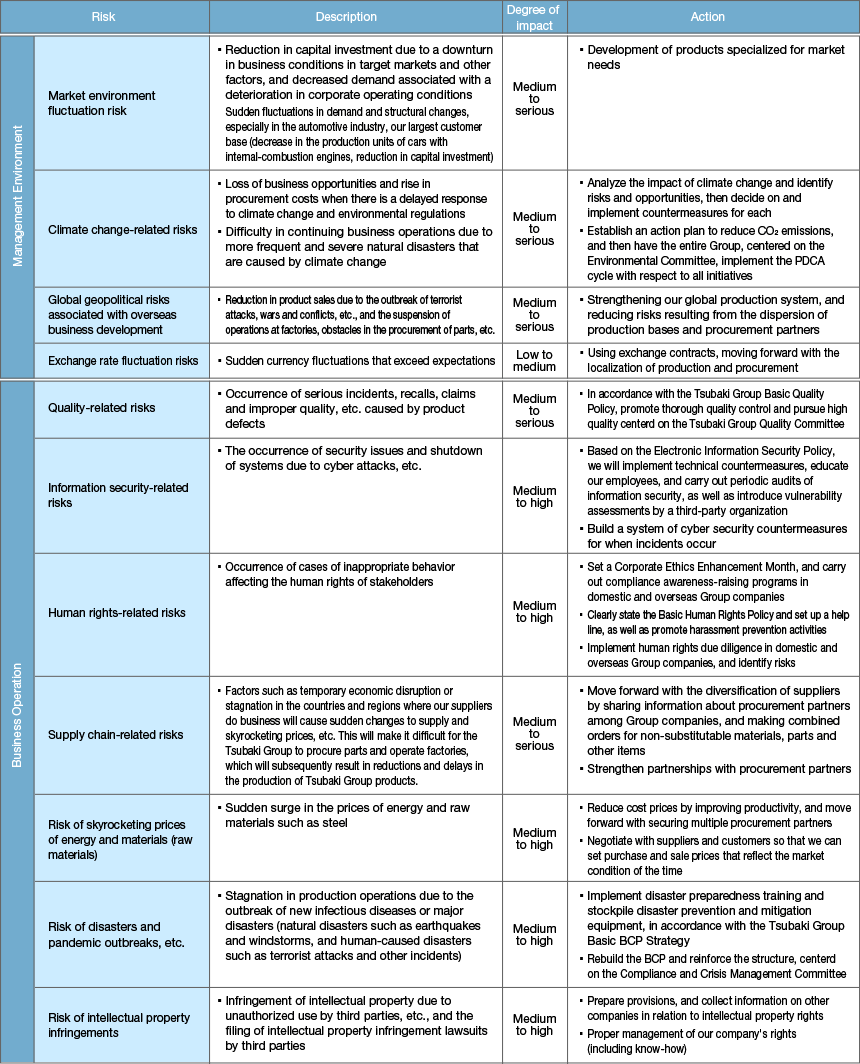Risk Management
Basic Concept
To sustain and advance our business, it's vital that we meet our corporate social responsibilities and effectively manage various risks inherent in our operations.
The Tsubaki Group has established a Risk Management Policy, under which it strives to prevent the actualization of risks and minimize possible losses by continually identifying and understanding risk factors regarding a host of risks that could significantly impact on management.
Risk Management Policy
Tsubakimoto Chain Co. and its group companies in both Japan and abroad have established the following principles to prevent potential risks that may have material adverse effects on the business management of the Tsubaki Group and to minimize damage if a risk does occur. The Tsubaki Group strives to become resilient to risks and to maintain the public trust and confidence that it has enjoyed.
1. We will identify, analyze, and assess risks associated with global business activities and take efficient and effective risk control measures. We will regularly monitor how the measures are being taken and make improvements where necessary.
2. We will have a risk management system in place and take continuous measures with a focus on risk prevention. We will ensure that the risk management system is well communicated throughout the Group and work as a team toward accomplishing a goal.
3. We will provide education and training to employees to raise their risk awareness and risk response skills so that risk management becomes a part of their routine.
4. In the event of disasters, accidents, or other emergency situations, we will promptly set up an emergency task force. With safety of life as the highest priority, we will work closely with the local community and take actions and conduct recovery operations promptly.
5. We will adapt risk control measures to best suit the specific requirements of the country or region.
Established: September 2003
Revised: November 2013
Promotional System
The Tsubaki Group has established several committees regarding corporate ethics; information security; the environment; quality; health and safety; and compliance and crisis management under the supervision of the Sustainability Committee in order to promote effective and efficient risk management. These committees promote risk countermeasures on a Groupwide basis by coordinating among one another to advance various ongoing measures geared toward identifying and evaluating risk factors as well as preventing the actualization of these risks.
In addition, we have established and are operating an emergency contact system on a global basis in the event of risk materialization to minimize possible losses.

Principal Initiatives for FY 2022
The Tsubaki Group regularly assesses the status of risks associated with each of its constituent companies and the status of response measures regarding such risks. Our various committees focused on corporate ethics, information security, the environment, quality, occupational health and safety, and compliance and crisis management undertake specific risk management initiatives in each area according to these assessment criteria.
In FY 2022, we focused five key areas: addressing changes in the environment, managing human rights issues and labor-related risks, managing supply chain risks, strengthening our crisis management systems, and bolstering our cyber security measures.
These activities are reported to the Sustainability Committee and necessary instructions are provided at appropriate intervals.
Business Continuity Planning/Disaster Preparedness Initiatives
In order to be prepared for natural disasters, incidents, and other unforeseen large-scale disasters that have become increasingly common in recent years, the Tsubaki Group has formulated a Basic BCP Policy and is implementing a variety of disaster preparedness initiatives.
(BCP: Business Continuity Plan)
1) Business continuity plan revision initiatives
In FY 2022, Tsubaki began revising its business continuity plans not only in-house but also at other Group companies in Japan. The aim is to have each business division and the general affairs department cooperate to achieve early restoration of business activities during an emergency, with priority placed on the safety of human lives. We will also hold BCP seminars for officers and Crisis Management Committee members, and work on strengthening the relevant systems.
2)Disaster preparedness drills
We hold evacuation and fire-fighting drills (in principle, at least once a year) for regular daytime employees and night shift workers, and for a variety of work hours when a disaster may occur. In FY 2023, we will implement e-Learning (online learning) to raise awareness about disaster preparedness for head office and branch employees who work in an office building.
3)Utilization of the safety confirmation system
In order to quickly confirm the safety of employees and their families in the event of a serious disaster such as an earthquake, typhoon, torrential rain, or heavy snowfall, we have introduced a safety confirmation system using smartphones. Thanks to conducting regular drills, we have been able quickly confirm the safety of employees and damage situation during an earthquake.
4)Stockpiling of disaster preparedness and mitigation items
The Tsubaki Group distributes disaster response manuals and earthquake response cards so that all employees can act appropriately in the event of an earthquake.
We are stockpiling water, food, simple toilet liner bags, blankets, lanterns, etc. at each business site, in anticipation of difficulties in returning home in the event of a disaster. Major business sites are equipped with satellite phones to secure a means of communication in the event of a disaster.



